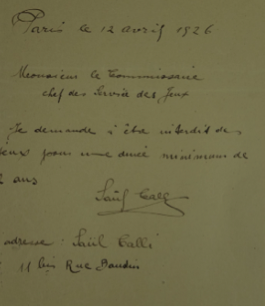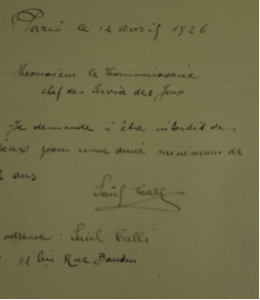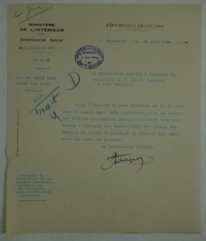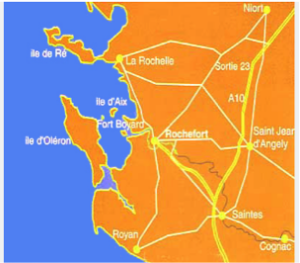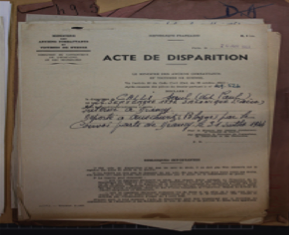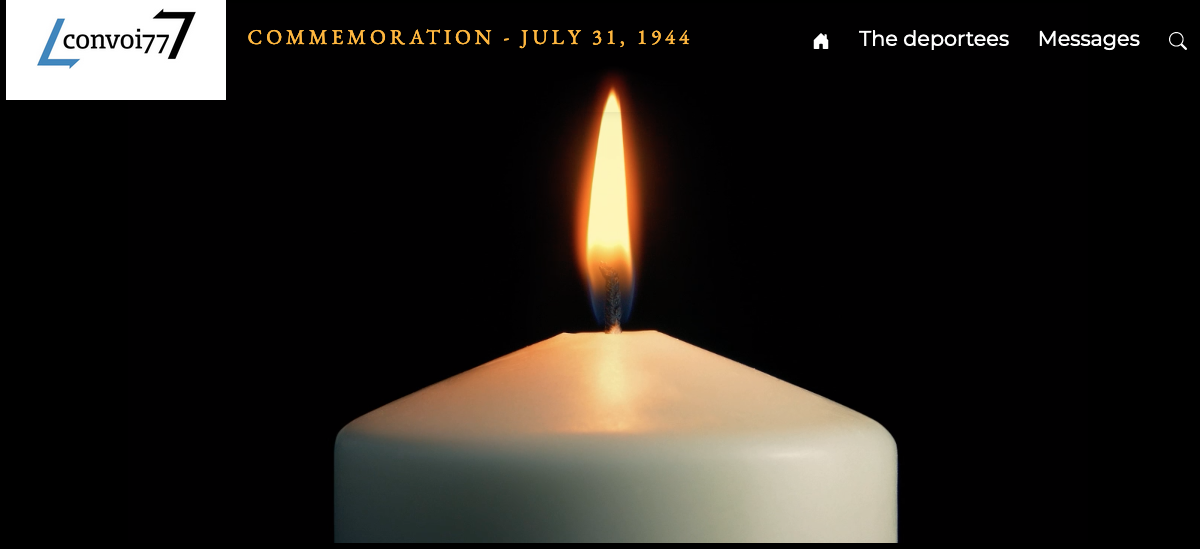Saul CALLI
Saul Calli was born in September 1891 in Thessaloniki, Greece (which was a part of the Ottoman Empire at the time) and died during the Second World War. According to official sources, he died either on 31 July, 1944 in Drancy, or on August 5, 1944 in the Auschwitz concentration camp and extermination center in Poland[1].
Saul Calli came from a Greek family. His parents were F. Liacsi and Accioni Sol, who was born in Thessaloniki in 1870.
Physical appearance and occupation
Saul Calli was 5’9 » tall and had brown hair, grey eyes and an oval face. His was a merchant, and dealt in various types of goods.
Life in France and official status
Saul emigrated to France in 1925. He lived most of the time at 11, rue Baudin in Paris, but he also had a home at 14, Avenue Thiers in Antibes, in the Alpes Maritimes department of France. The Foreigners Department of the Antibes Police Headquarters holds a certified copy of his identity card, which was issued on October 6, 1939, bore the number 39 AC 24303, and was valid until October 6, 1942. This was then replaced by another card, numbered 39 AC 16792 and valid from 1942 to 1945, which was issued by the police.
A love of gambling that led to him being banned from casinos
Saul Calli had a passion for gambling and often went to casinos. He was aware that he had become addicted to gambling and he himself asked to be banned from casinos for a minimum of two years. In a letter dated April 19, 1926, the Chief of Police in Paris notified the Minister of Home Affairs of this request.
©French National archives in Pierrefitte,
Saul Calli, ref. 19940437/24 Dossier 2042
On August 21, 1926, the Special Commissioner for the Ministry of Home Affairs reported that Saul Calli, who was living in Paris at the time, had been asked to leave the casino in Royan, where he had been dealt a card during a game of baccarat.
©French National archives in Pierrefitte
Saul Calli, ref. 19940437/24 Dossier 2042
Saul Calli’s personal life and testimony from a fellow prisoner
Although he was not officially married, Saul Calli had a long-term relationship with a woman called Susanna Schrecht, whom he regarded as his lawful wife. A Mr. Rosenberg, a fellow prisoner in Auschwitz, testified to this in a statement drawn up by Albert Danotte, a notary in Cannes, in the Alpes-Maritimes department of France, on September 21, 1945[2].
Mr. Rosenberg stated that he had gotten to know Saul Calli in the Auschwitz camp and that Saul was then transferred to Birkenau, where he was executed. He said that before he died, Saul Calli had asked him to pass on his last requests, given that he was unable to write them down in the camp. He stated that Saul had repeatedly and unequivocally expressed his wish that all his assets be left to Susanna Schrecht, with whom he lived as husband and wife in Antibes.
Mr. Rosenberg’s testimony proves that Saul Calli did not in fact die when he first arrived at Auschwitz-Birkenau, but was selected to enter the camp for forced labor and thus died at a later date.
In addition, the mayor of Antibes issued a certificate to confirm that it was common knowledge that Saul Calli and Susanna Schrecht had been living together as husband and wife. This certificate was attached to the deed drawn up by the notary.
Saul Calli declared missing and officially acknowledged to have died
On February 1, 1947, Elie Calli, Saul Calli’s nephew, who also lived in Antibes, wrote to the mayor and to the local police asking for a certificate to confirm that his uncle had been gone for a long time. He pointed out that Saul Calli had no children and no direct heirs, so no one was claiming any war pension or compensation payable to the families of political prisoners who had gone missing.
On August 25, 1947, the Ministry of Veterans Affairs and Victims of War confirmed that Saul Calli, who was born in Thessaloniki on September 22, 1891 and lived in Antibes was a political deportee, meaning that he had been deported for political reasons on grounds of his “race”.
Six years later, on February 23, 1953, Elie Calli applied for an official death certificate in order to settle his uncle’s estate and so that he could claim compensation for the families of political deportees who had died in detention.
On April 20, 1953, the Ministry of Veterans Affairs and War Victims issued a missing person’s certificate attesting that Saul Calli had been deported to Auschwitz on the convoy that left Drancy internment camp on July 31, 1944.
© Victims of Contemporary Conflicts Archives Division of the Ministry of Defense Historical ,
Service, in Caen, file on Saul, known as Paul, Calli, ref. 21 P 432 684
Belated acknowledgement that Saul Calli died in Auschwitz
On December 24, 1955, the court office in Grasse, also in the Alpes-Maritimes department, through the intermediary of the Public Prosecutor, wrote to the Ministry of Veterans and War Victims Litigation Department to ask for an official declaration that Saul Calli had gone missing and was presumed dead.
On October 10, 1956, the court in Grasse notified the ministry that Saul, known as Paul, Calli had died on July 31, 1944 in Drancy. This was entered into the municipal records register in Antibes town hall on April 18, 1956. The death was entered under the name of Saul, known as Paul, Calli, born September 22, 1891 in Thessaloniki.
However, subsequent research by the Ministry of Veterans Affairs and War Victims concluded that Saul Calli had in fact died in Auschwitz on 5 August 1944[3], five days after he was deported. This was in accordance with a French law that applied to all prisoners who were thought to have died soon after they arrived in Auschwitz.
The French Ministry of National Defense then issued a formal declaration that amended the date and place of Saul Calli’s death. This was noted in the margin of the original entry in the municipal register and published in the French Official Gazette on February 14, 2008. It said that Saul Calli died on August 5, 1944 in the Auschwitz concentration camp in Poland, rather than in Drancy on July 31, 1944.
Further records and official confirmation
According to the Drancy prisoner register, the Gestapo arrested Saul Calli in June 1944 and transferred him to Drancy internment camp on July 12, 1944. His Drancy search log number was 156 and his receipt number was 6434.
Lastly, the Department of Statuses, Pensions and Social Reintegration, wrote to the Antibes town hall on 14 February 2008, officially certifying that Saul Calli had died during deportation, in Auschwitz, on 5 August 1944. In accordance with the French law 85-528, dated May 1985, the phrase “Died during deportation” was then added to his death certificate.
Sources
- Convoy 77 project archives, French National archives in Pierrefitte, file on Saul Calli, ref. 19940437/24 Dossier 2042
- Victims of Contemporary Conflicts Archives Division of the Ministry of Defense Historical Service, in Caen, file on Saul, known as Paul, Calli, ref. 21 P 432 684
- Drancy search log
- The original Convoy 77 deportation list
A pdf presentation of the project, in French and Greek, can be found here
This project was carried out by a group of 9th grade students during French classes at the First Public Middle School of Panorama in Thessaloniki, Greece, with the guidance of their French teacher, Ms. Anastasia Kokkini
Notes et références
[1] These were the official dates given at the time, but we now know that the people who were deported on Convoy 77 and murdered on arrival in Auschwitz actually died that same day, August 3, 1944.
[2] This testimony is held in the Victims of Contemporary Conflicts Archives Division of the Ministry of Defense Historical Service, in Caen, file on Saul, known as Paul, Calli, ref. 21 P 432 684.
[3] Again, this was the official date given at the time, but we now know that the people who were deported on Convoy 77 and murdered on arrival in Auschwitz actually died that same day, August 3, 1944.


 Français
Français Polski
Polski